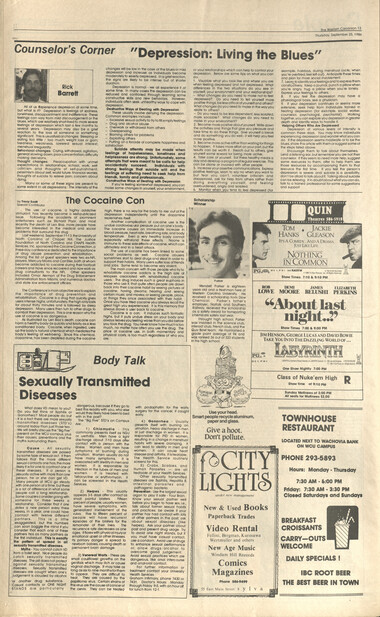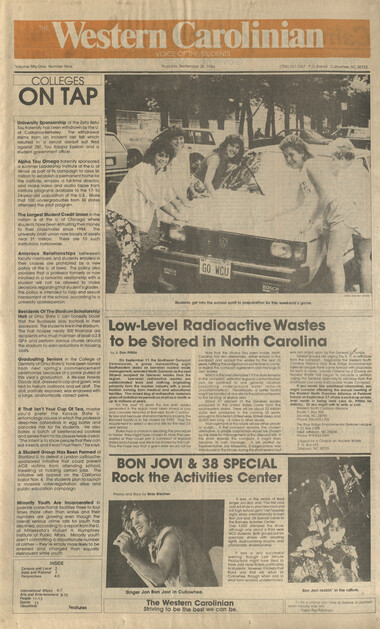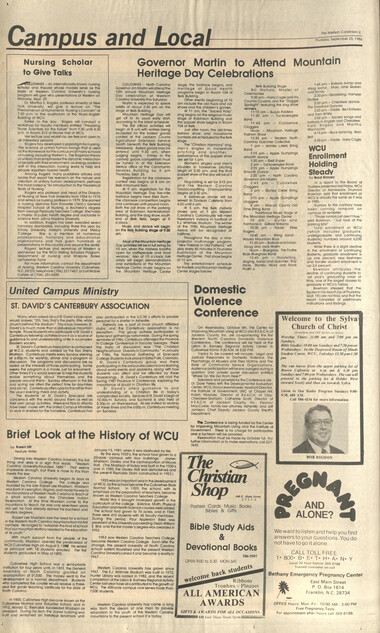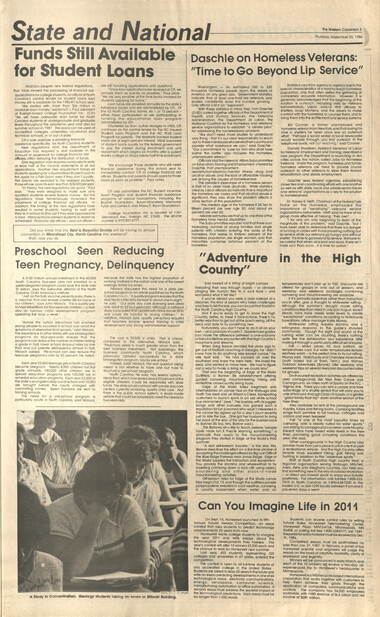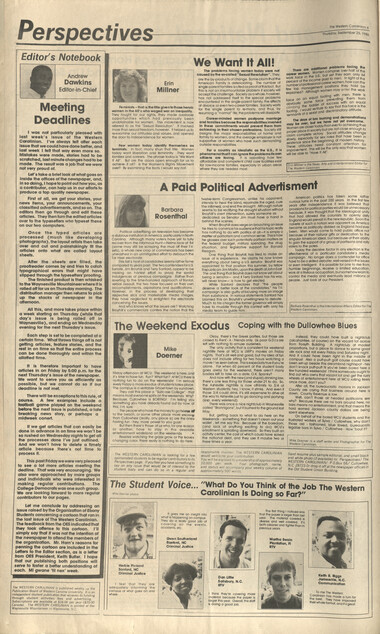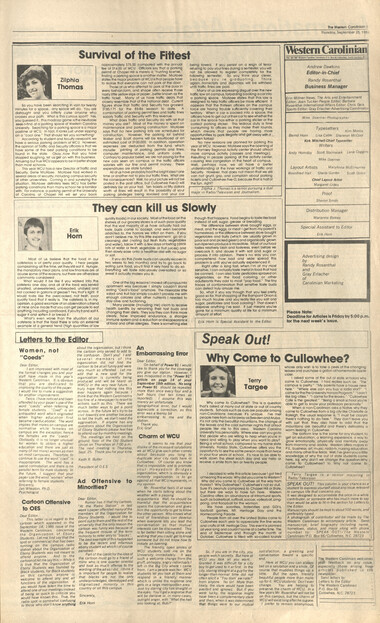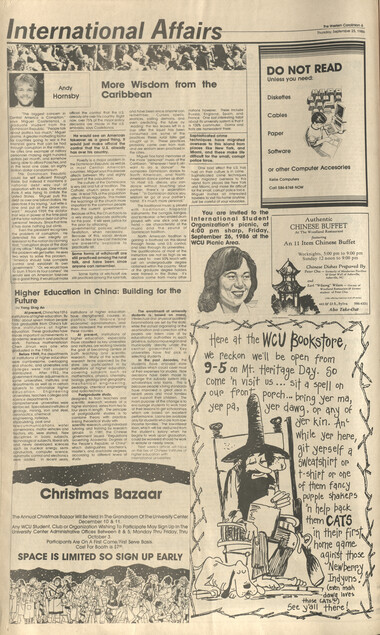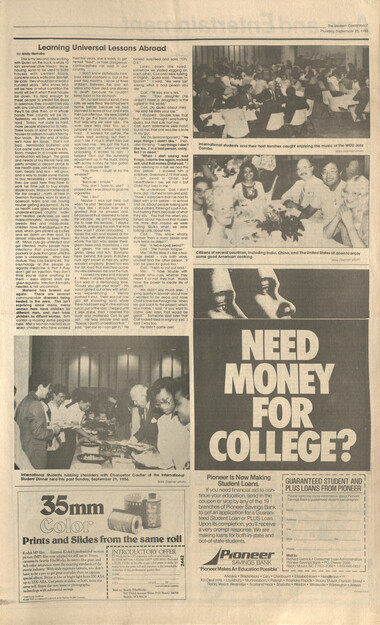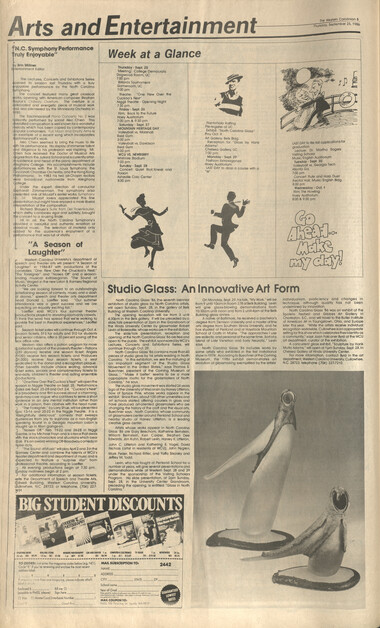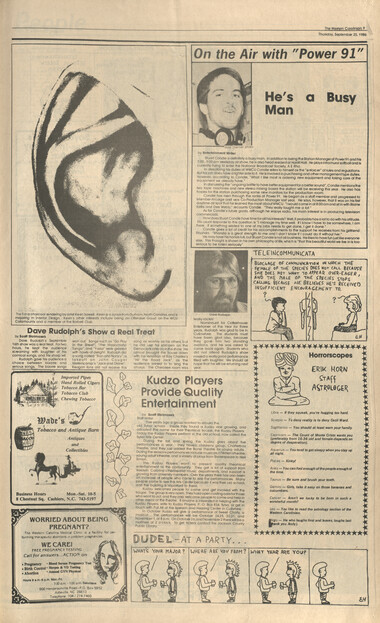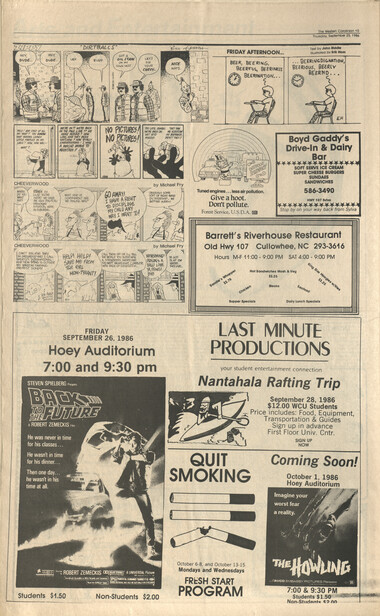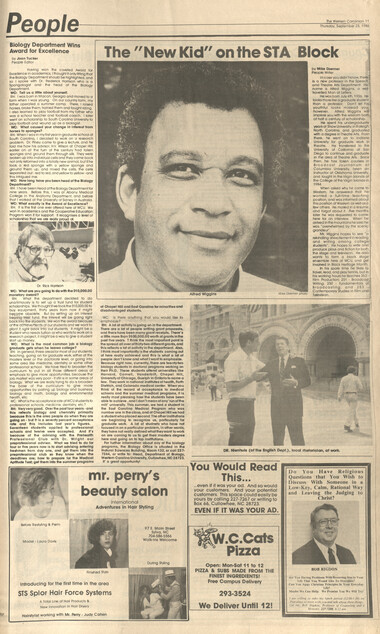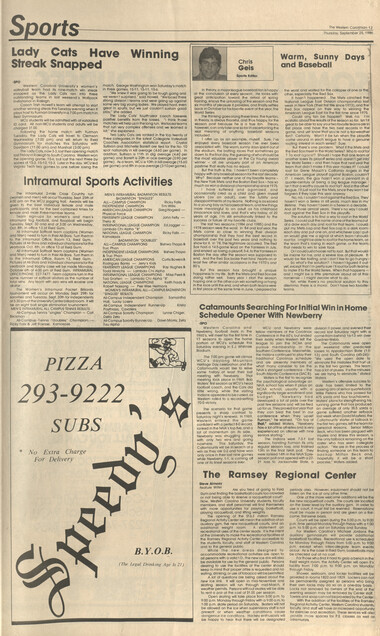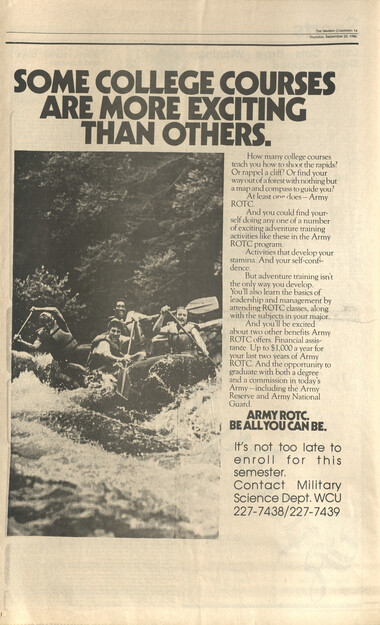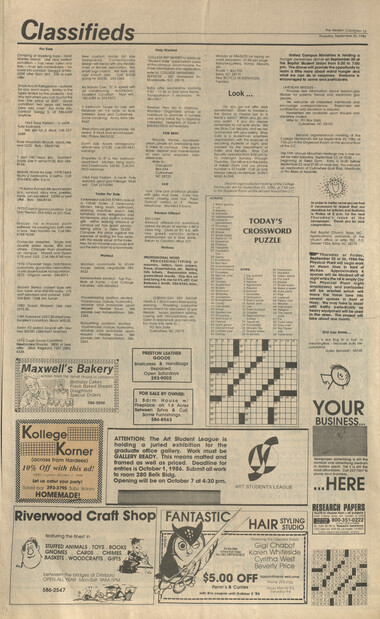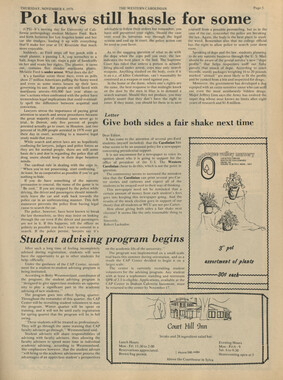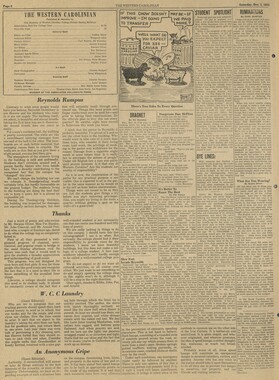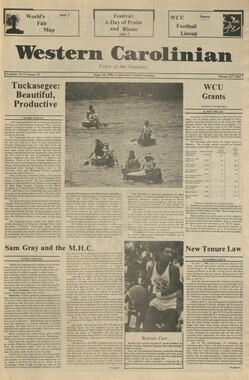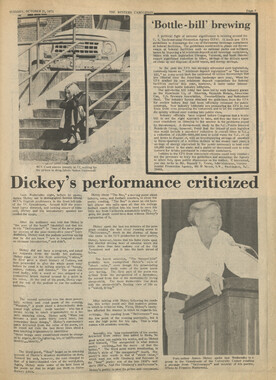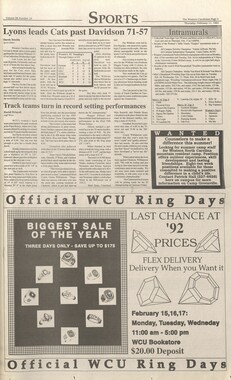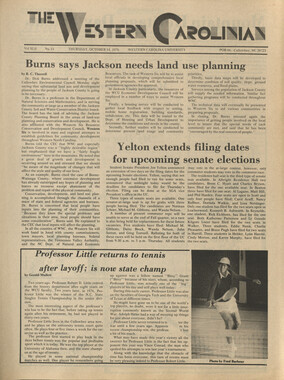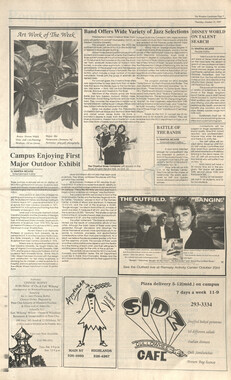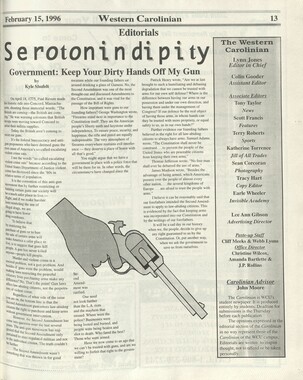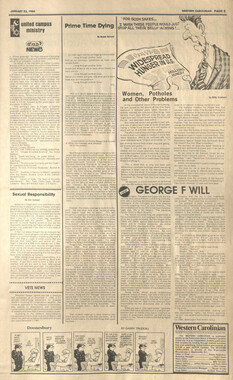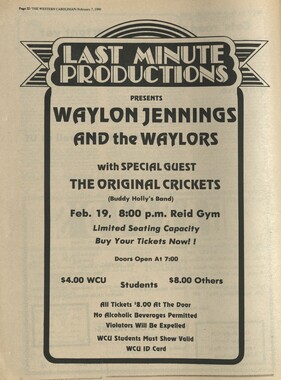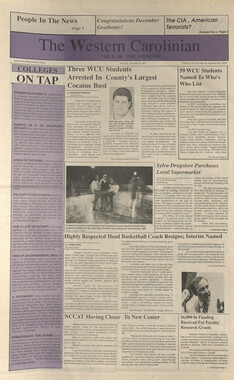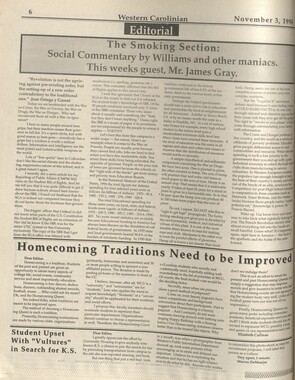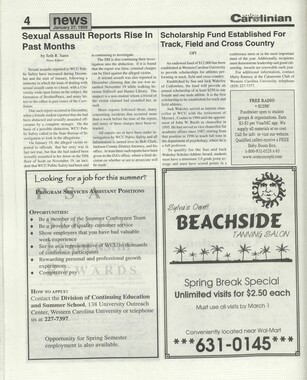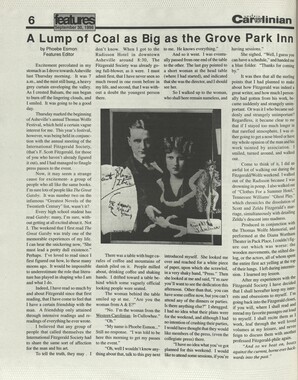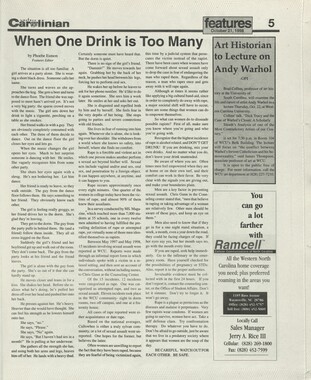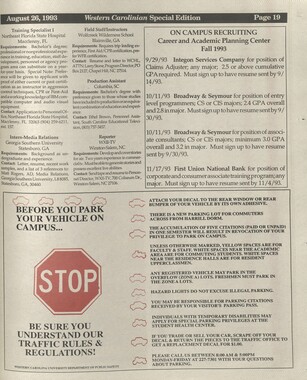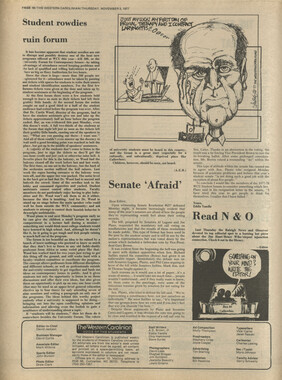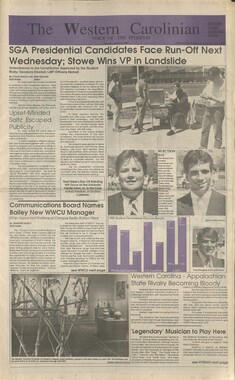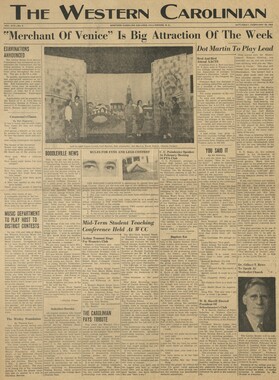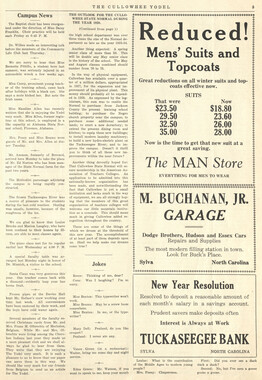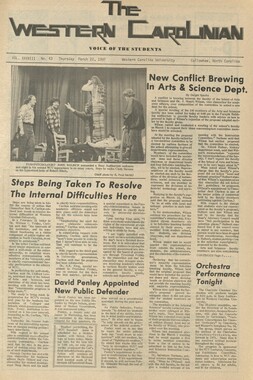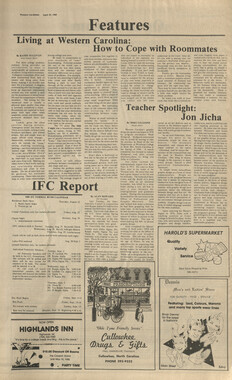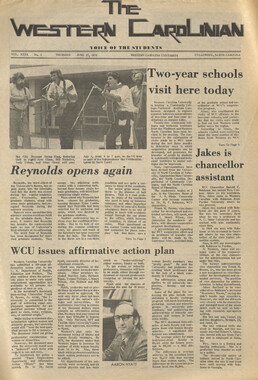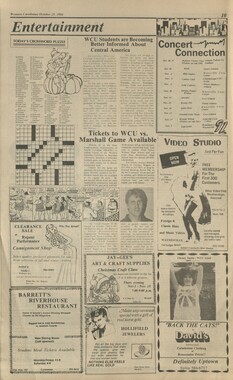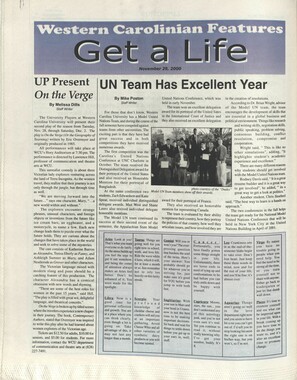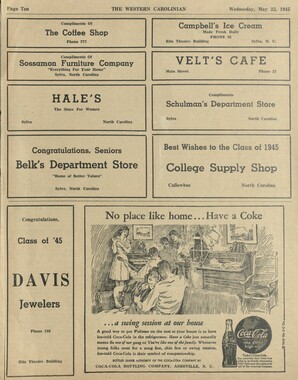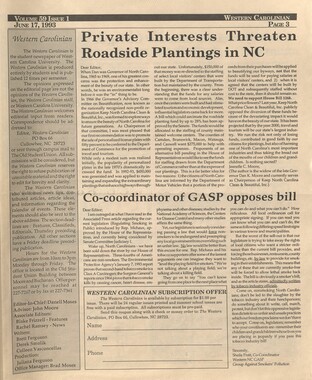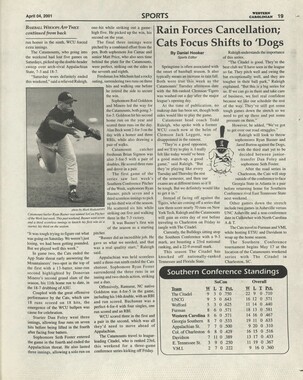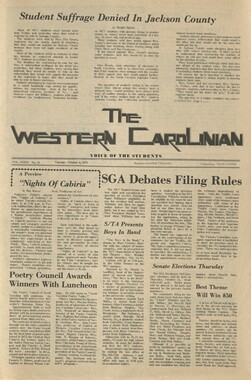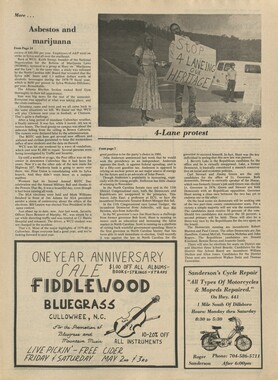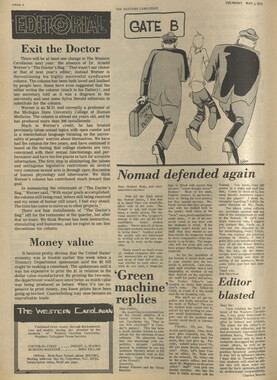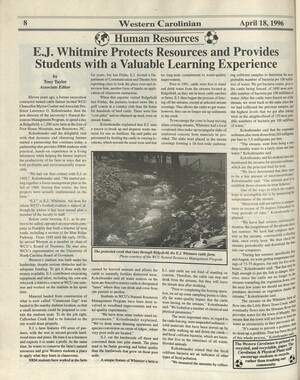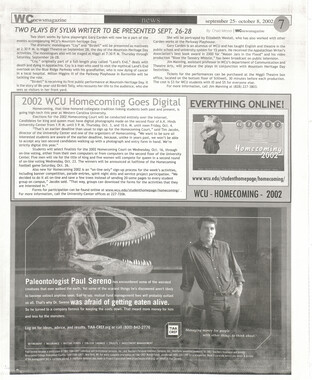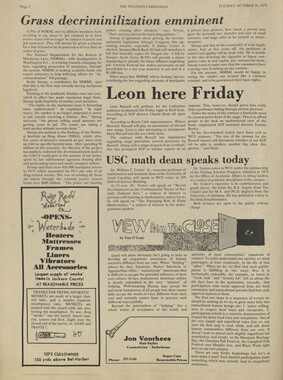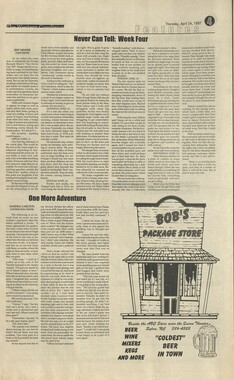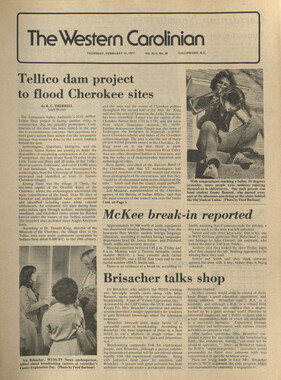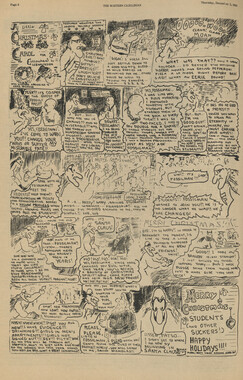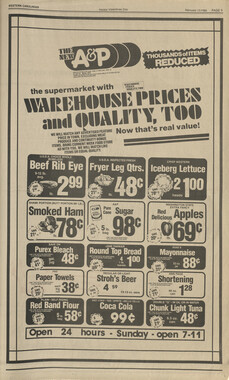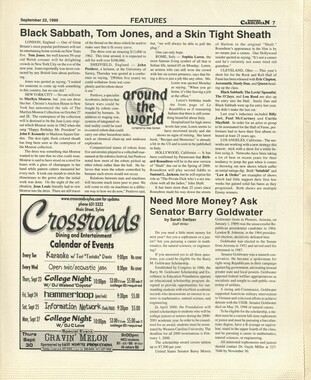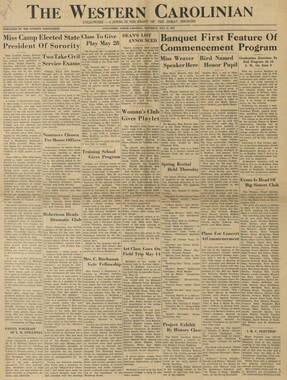Western Carolina University (20)
View all
- Canton Champion Fibre Company (2308)
- Cherokee Traditions (293)
- Civil War in Southern Appalachia (165)
- Craft Revival (1942)
- Great Smoky Mountains - A Park for America (2767)
- Highlights from Western Carolina University (430)
- Horace Kephart (941)
- Journeys Through Jackson (154)
- LGBTQIA+ Archive of Jackson County (26)
- Oral Histories of Western North Carolina (314)
- Picturing Appalachia (6772)
- Stories of Mountain Folk (413)
- Travel Western North Carolina (160)
- Western Carolina University Fine Art Museum Vitreograph Collection (129)
- Western Carolina University Herbarium (92)
- Western Carolina University: Making Memories (708)
- Western Carolina University Publications (2283)
- Western Carolina University Restricted Electronic Theses and Dissertations (146)
- Western North Carolina Regional Maps (71)
- World War II in Southern Appalachia (131)
University of North Carolina Asheville (6)
View all
- Allanstand Cottage Industries (62)
- Appalachian National Park Association (53)
- Bennett, Kelly, 1890-1974 (1388)
- Berry, Walter (76)
- Brasstown Carvers (40)
- Carver, George Washington, 1864?-1943 (26)
- Cathey, Joseph, 1803-1874 (1)
- Champion Fibre Company (233)
- Champion Paper and Fibre Company (297)
- Cherokee Indian Fair Association (16)
- Cherokee Language Program (22)
- Crowe, Amanda (40)
- Edmonston, Thomas Benton, 1842-1907 (7)
- Ensley, A. L. (Abraham Lincoln), 1865-1948 (275)
- Fromer, Irving Rhodes, 1913-1994 (70)
- George Butz (BFS 1907) (46)
- Goodrich, Frances Louisa (120)
- Grant, George Alexander, 1891-1964 (96)
- Heard, Marian Gladys (60)
- Kephart, Calvin, 1883-1969 (15)
- Kephart, Horace, 1862-1931 (313)
- Kephart, Laura, 1862-1954 (39)
- Laney, Gideon Thomas, 1889-1976 (439)
- Masa, George, 1881-1933 (61)
- McElhinney, William Julian, 1896-1953 (44)
- Niggli, Josephina, 1910-1983 (10)
- North Carolina Park Commission (105)
- Osborne, Kezia Stradley (9)
- Owens, Samuel Robert, 1918-1995 (11)
- Penland Weavers and Potters (36)
- Roberts, Vivienne (15)
- Roth, Albert, 1890-1974 (142)
- Schenck, Carl Alwin, 1868-1955 (1)
- Sherrill's Photography Studio (2565)
- Southern Highland Handicraft Guild (127)
- Southern Highlanders, Inc. (71)
- Stalcup, Jesse Bryson (46)
- Stearns, I. K. (213)
- Thompson, James Edward, 1880-1976 (226)
- United States. Indian Arts and Crafts Board (130)
- USFS (683)
- Vance, Zebulon Baird, 1830-1894 (1)
- Weaver, Zebulon, 1872-1948 (58)
- Western Carolina College (230)
- Western Carolina Teachers College (282)
- Western Carolina University (1794)
- Western Carolina University. Mountain Heritage Center (18)
- Whitman, Walt, 1819-1892 (10)
- Wilburn, Hiram Coleman, 1880-1967 (73)
- Williams, Isadora (3)
- Cain, Doreyl Ammons (0)
- Crittenden, Lorraine (0)
- Rhodes, Judy (0)
- Smith, Edward Clark (0)
- Appalachian Region, Southern (2399)
- Asheville (N.C.) (1917)
- Avery County (N.C.) (26)
- Blount County (Tenn.) (161)
- Buncombe County (N.C.) (1671)
- Cherokee County (N.C.) (283)
- Clay County (N.C.) (555)
- Graham County (N.C.) (233)
- Great Smoky Mountains National Park (N.C. and Tenn.) (510)
- Haywood County (N.C.) (3522)
- Henderson County (N.C.) (70)
- Jackson County (N.C.) (4692)
- Knox County (Tenn.) (25)
- Knoxville (Tenn.) (12)
- Lake Santeetlah (N.C.) (10)
- Macon County (N.C.) (420)
- Madison County (N.C.) (211)
- McDowell County (N.C.) (39)
- Mitchell County (N.C.) (132)
- Polk County (N.C.) (35)
- Qualla Boundary (981)
- Rutherford County (N.C.) (76)
- Swain County (N.C.) (2113)
- Transylvania County (N.C.) (247)
- Watauga County (N.C.) (12)
- Waynesville (N.C.) (73)
- Yancey County (N.C.) (72)
- Aerial Photographs (3)
- Aerial Views (60)
- Albums (books) (4)
- Articles (1)
- Artifacts (object Genre) (228)
- Bibliographies (1)
- Biography (general Genre) (2)
- Cards (information Artifacts) (38)
- Clippings (information Artifacts) (191)
- Crafts (art Genres) (622)
- Depictions (visual Works) (21)
- Design Drawings (1)
- Drawings (visual Works) (184)
- Envelopes (73)
- Facsimiles (reproductions) (1)
- Fiction (general Genre) (4)
- Financial Records (12)
- Fliers (printed Matter) (67)
- Glass Plate Negatives (381)
- Guidebooks (2)
- Internegatives (10)
- Interviews (812)
- Land Surveys (102)
- Letters (correspondence) (1013)
- Manuscripts (documents) (619)
- Maps (documents) (177)
- Memorandums (25)
- Minutes (administrative Records) (59)
- Negatives (photographs) (5835)
- Newsletters (1285)
- Newspapers (2)
- Occupation Currency (1)
- Paintings (visual Works) (1)
- Pen And Ink Drawings (1)
- Periodicals (193)
- Personal Narratives (10)
- Photographs (12976)
- Plans (maps) (1)
- Poetry (7)
- Portraits (1960)
- Postcards (329)
- Programs (documents) (151)
- Publications (documents) (2237)
- Questionnaires (65)
- Scrapbooks (282)
- Sheet Music (2)
- Slides (photographs) (402)
- Songs (musical Compositions) (2)
- Sound Recordings (796)
- Specimens (92)
- Speeches (documents) (15)
- Tintypes (photographs) (8)
- Transcripts (322)
- Video Recordings (physical Artifacts) (23)
- Vitreographs (129)
- Text Messages (0)
- A.L. Ensley Collection (275)
- Appalachian Industrial School Records (7)
- Appalachian National Park Association Records (336)
- Axley-Meroney Collection (2)
- Bayard Wootten Photograph Collection (20)
- Bethel Rural Community Organization Collection (7)
- Blumer Collection (5)
- C.W. Slagle Collection (20)
- Canton Area Historical Museum (2110)
- Carlos C. Campbell Collection (282)
- Cataloochee History Project (65)
- Cherokee Studies Collection (4)
- Daisy Dame Photograph Album (5)
- Daniel Boone VI Collection (1)
- Doris Ulmann Photograph Collection (112)
- Elizabeth H. Lasley Collection (1)
- Elizabeth Woolworth Szold Fleharty Collection (4)
- Frank Fry Collection (95)
- George Masa Collection (173)
- Gideon Laney Collection (452)
- Hazel Scarborough Collection (2)
- Hiram C. Wilburn Papers (28)
- Historic Photographs Collection (236)
- Horace Kephart Collection (861)
- Humbard Collection (33)
- Hunter and Weaver Families Collection (1)
- I. D. Blumenthal Collection (4)
- Isadora Williams Collection (4)
- Jesse Bryson Stalcup Collection (47)
- Jim Thompson Collection (224)
- John B. Battle Collection (7)
- John C. Campbell Folk School Records (80)
- John Parris Collection (6)
- Judaculla Rock project (2)
- Kelly Bennett Collection (1407)
- Love Family Papers (11)
- Major Wiley Parris Civil War Letters (3)
- Map Collection (12)
- McFee-Misemer Civil War Letters (34)
- Mountain Heritage Center Collection (4)
- Norburn - Robertson - Thomson Families Collection (44)
- Pauline Hood Collection (7)
- Pre-Guild Collection (2)
- Qualla Arts and Crafts Mutual Collection (12)
- R.A. Romanes Collection (681)
- Rosser H. Taylor Collection (1)
- Samuel Robert Owens Collection (94)
- Sara Madison Collection (144)
- Sherrill Studio Photo Collection (2558)
- Smoky Mountains Hiking Club Collection (616)
- Stories of Mountain Folk - Radio Programs (374)
- The Reporter, Western Carolina University (510)
- Venoy and Elizabeth Reed Collection (16)
- WCU Gender and Sexuality Oral History Project (32)
- WCU Mountain Heritage Center Oral Histories (25)
- WCU Oral History Collection - Mountain People, Mountain Lives (71)
- WCU Students Newspapers Collection (1744)
- Western North Carolina Tomorrow Black Oral History Project (69)
- William Williams Stringfield Collection (2)
- Zebulon Weaver Collection (109)
- African Americans (390)
- Appalachian Trail (35)
- Artisans (521)
- Cherokee art (84)
- Cherokee artists -- North Carolina (10)
- Cherokee language (21)
- Cherokee pottery (101)
- Cherokee women (208)
- Church buildings (167)
- Civilian Conservation Corps (U.S.) (110)
- College student newspapers and periodicals (1830)
- Dams (103)
- Dance (1023)
- Education (222)
- Floods (61)
- Folk music (1015)
- Forced removal, 1813-1903 (2)
- Forest conservation (220)
- Forests and forestry (1058)
- Gender nonconformity (4)
- Great Smoky Mountains National Park (N.C. and Tenn.) (181)
- Hunting (38)
- Landscape photography (10)
- Logging (103)
- Maps (84)
- Mines and mineral resources (8)
- North Carolina -- Maps (18)
- Paper industry (38)
- Postcards (255)
- Pottery (135)
- Railroad trains (71)
- Rural electrification -- North Carolina, Western (3)
- School integration -- Southern States (2)
- Segregation -- North Carolina, Western (5)
- Slavery (5)
- Sports (452)
- Storytelling (245)
- Waterfalls -- Great Smoky Mountains (N.C. and Tenn.) (66)
- Weaving -- Appalachian Region, Southern (280)
- Wood-carving -- Appalachian Region, Southern (328)
- World War, 1939-1945 (173)
Western Carolinian Volume 51 (52) Number 09
Item
Item’s are ‘child’ level descriptions to ‘parent’ objects, (e.g. one page of a whole book).
-
-
Tpa Western Carolinian 12 Thursday, September 25, 1986 Counselor's Corner "Depression: Living the Blues // All of us experience depression at some time, but what is it? Depression is feelings of sadness, loneliness, disappointment and indifference. These feelings can vary from mild discouragement or the blues, which are relatively short-lived to more severe feelings of depression which last a few months to several years. Depression may also be a grief reaction to the loss of someone or something significant. This is usuallysical changes: Sleeping or eating too little / too much; weight loss ot gain; tiredness, weakness, lowered sexual interest; menstrual irregularity. Behavioral changes: Crying, withdrawal, agitation, general slowing down; poor concentration; difficulty making decisions. Thought changes: Preoccupation with unmet expectations in relationships, school, work; self- criticism and thoughts of self-punishment; pessimism about self, world future; financial worries; thoughts of suicide to relieve pain; concern about dying. Many or some of these signs are present to some extent in all depressions. The intensity of the changes will be low in the case of the blues or mild depression and increase as individuals become moderately to severly depressed. In a grief reaction, the signs are likely to be intense but of shorter duration. Depression is normal - we all experience it at some time. In many cases the depression can be reduced and controlled through learning some constructive skills and new behaviors. However, individuals often seek unhealthy ways to cope with depression. Destructive Ways of Dealing with Depression These usually involve denying the depression. Common examples include: -- Excessive sexual activity to try to fill empty feelings - Drug and alcohol abuse - Overwork or withdrawal from others -- Overspending - Blaming others for problems -- Exploiting others - Putting on a facade of complete happiness and satisfaction , Suicide attemts may be made when feelings of hopelessness, loneliness and helplessness are strong. Unfortunately, some attempts that were meant to be calls for help accidentally succeed. Individuals with strong feelings that suicide will end the feelings of suffering need to seek help from friends, family and professionals. Constructive Ways of Dealing with Depression If you're feeling somewhat depressed, you can make some changes in yourself, your environment, or your relationships which can help to control your depression. Below are some tips on what you can do: 1. Visualize what you look like and where you are when feeling depressed and not depressed. What differences in the two situations do you see in yourself, your environment and your relationships? - What changes do you need to make not to feel depressed? Do you need to tell yourself more positive things, be less critical of yourself and others? What changes do you need to make in the wayyou relate to others? - Do you need to be less dependent, less isolated, more sociable? What changes do you need to make in your environment? 2. Become more positive about yourself. Writedown the activities and things that give you pleasure and take time to do these things. Give yourself a break and do something you do well - it will help you feel more positive. 3. Become more active rather than waiting for things to happen. It takes more effort on your part, but the results can be worth it. Reach out to others, give yourself some reward for being more active. 4. Take care of yourself. Eat three healthy meals a day and develop a program of regular exercise. This can be alone or involved with other people. 5. Increaseyourassertivecommunications. Express positive feelings, learn to say no when you want to but fear you can't, volunteer criticism and disapproval, ask for help from others rather than doing everything yourself, and feeling overburdened, angry and isolated. 6. Monitor when you tend to feel depressed (for example, holidays, during menstrual cycle, when you're overtired, feel left out). Anticipate these times and plan for more social involvement. 7. Learn to identifyyourfeelingsand to express them constructively. Keep a journal, punch a pillow when you're angry, hug a pillow when you're lonely. Express your feelings to others. 8. If you feel Ihe depression may have a physiologcal basis, see a physician. 9. If your depression continues or seems more extensive, seek help from individuals trained in treating depression (for example, social worker, counselor, psychologist, psychiatrist). Working together, you can explore you depression in greater depth and identify ways to handle it. Helping Others Who Are Depressed Depression at various levels of intensity is common these days. You may know individuals experiencing depression and wonder what you can do. If the depression seems moderate or to be the blues, share this article with them or suggest some of the steps listed above. Encourage them to talk about themselves. Lend a listening ear, but remember you are not their counselor. If they seem to need more help, suggest some resources to them, offer to help them use those resources by accompanying them to that resource the first time. If you feel the person's depression is severe and suicide is a possibility, don't be afraid to talk about it. Talking about suicide can be relieving. If in doubtabout what you can do, talk to a trained professional for some suggestions and support. by Tracy Scott Special Contributor The use of cocaine, a highly addictive stimulant, has recently become a well-publicized issue. Following the accidents of prominent entertainers such as Richard Pryor, and most recently the death of Len Biaz, more people have become interested in the medical and social problems that surround this drug. Last weekend, September 11-13, the University of North Carolina at Chapel Hill, The Justice Foundation of North Carolina and CHAPS Health Services, Inc. sponsored the Cocaine Connection, a three-day conference dedicated to the importance of drug abuse prevention and rehabilitation. Among the list of guest speakers were two ex-NFL players, Mercury Morris and Carl Eller, both of whom became addicted to cocaine during their football careers and have since recovered and now work as drug consultants to the NFL. Other speakers included Omar Aleman of the Drug Enforcement Administration from Miami, and numerous doctors and state taw enforcement officers. The Conference's main objective was to explain the importance of drug prevention and rehabilitation. Cocaine is a drug that quickly gives users intense highs; unfortunately, the high only lasts for about thirty minutes and is followed by deep depression. Many users then turn to other drugs to combat their depression. This is one reason why the use of cocaine is so dangerous. As illustrated by Len Biaz's death, cocaine can harm a healthy body as quickly and fatally as a less conditioned body. Cocaine, when ingested, uses up the body's natural chemical which mediatesthe body's feeling of well-being. Since this chemical, dopamine, has been depleted during the cocaine The Cocaine Con Scholarship Winner high, there is no way for the body to rise out of the depression independently until the dopamine replenishes itself. Another complication of cocaine use is the undue cardiovascular pressure put on one's body. The cocaine causes an immediate increase in blood pressure, heart rate, breathing rate, and body temperature. Even a very healthy body cannot repeatedly withstand these effects. Noone is immune to these side effects of cocaine, which can ultimately end in a heart attack. The use of cocaine has been linked to some social problems as well. Cocaine abusers sometimes start to deal drugs and steal in order to support their habits. Many users suffer loss of friends and jobs. Some tend to become very violent. The main concern with those people who try to rehabilitate cocaine addicts is the high rate of relapses associated with rehabilitated cocaine users. The drug induces such a great euphoria in those who use it, that quite often people are drawn back into their cocaine habit by seeing pictures of cocaine; having dreams; hearing and seeing certain music and movies; or seeing people, place, or things they once associated with their habit. Once you have tried cocaine you always recall the great high you experienced. It is this memory that always draws a user back to cocaine. Cocaine is a con. It induces such fantastic highs, but it puts undue stress on your body and always leaves you feeling worse than you did before you took the drug. You never know how much is too much, no matter how often you use the drug. The price of cocaine use, In both momentary and physical costs, is too much regardless of who you are. Parker Wendell Parker is eighteen years old and a freshman here at Western Carolina University. He received a scholarship from Dow Chemical. Parker's father's employer, Norfolk and Southern Railway, received the scholarship as a safety award for transporting chemicals safely last year. Throught high school, Parker was involved in the science club, interact club, French club, and the Quiz Bowl team. He maintained a grade point average of 94 and was ranked 36 out of 320 students in his high school. ROB DEMI JAMES ELIZABETH LOWE MOORE BELUSHI PERKINS "About last night» Show Times 7:00 & 9:00 PM Body Talk Sexually Transmitted Diseases What does VD mean to you? Do you first think of Syphilis or Gonorrhea? Most people do; but it is a fact there are more sexually transmitted diseases (STD's) around today than just those two. We will briefly discuss the "Big Five" present on the WCU campus, plus their causes, preventions and the myths surrounding them. Cause - All sexually transmitted diseases are passed by some type of sexual act. It then follows that the more different sexual contacts one has, the more likely it is for one to contract one of these diseases. If a person is sexually active with more than one person, he or she can get VD. Many people at WCU go steady with one person at a time, but there is a lot of difference in what some people call a long relationship. Some couples consider going with someone for three weeks a relationship. Consider that if one dates a new person every three weeks, in a year, one could have contact with twelve different partners. This is a little exaggerated, but the numbers can soon boggle the mind if you consider that each one of these partners has as many partners as the first individual. This Is exactly the pattern of spread in all sexually transmitted diseases. Myths - You cannot catch VD from a toilet seat. Nice people do catch sexually transmitted diseases. The pill does not protect against sexually transmitted diseases. Sexually transmitted diseases are caught when one's judgement is clouded by alcohol or another drug substance. Casual contacts or ONE NIGHT STANDS are particularly dangerous, because if they go to bed this readily with you, who else would they likely have been to bed with in the past? The "Big Five" STD's on Campus Are: 1) Chlamydia - This commonly presents itself as NGU or urethritis. Men have a light discharge about 7-10 days after contact with a person with the illness. Women and men have symptoms of burning during urination. Women usually do not have many symptoms. It is associated with sterility in men and women. It is responsible for infection in the tubes of men and women. It is treated with Tetracycline ot erythromycin. It can be screened in the Health Services. 2) Herpes - This usually appears 3-5 days after contact as small painful blisters. Fifteen percent of people, usually women, have severe symptoms, with generalized involvement of the vulva. Five to fifteen percent of people will have recurrent episodes of the blisters for the remainder of their lives. The recurrence rate decreases as one ages. Itflares with physical injuryor emotional upset or other illnesses. Its primary danger is spread to newborn babies, causing death or permanent brain damage. 3) Venereal Warts - These are small cauliflower growths on the genitals which may itch or cause vaginal discharge. It may take as long as six to nine months forthem to appear. They are difficult to treat. They are caused by the papilloma virus. Certain strains of this virus are the cause of cancer of the cervix. They can be treated with podophyllin for fhe warts; surgery for the cancer, if caught early. 4) Gonorrhea - Usually presents itself with burning on urination, heavy discharge in men or just discharge in women. It is responsible for PID in women, resulting in a change in menstrual habits with severe cramping. It can lead to sterility in men and women. It can cause heart disease and arthritis. It is treatable. The Health Service routinely screens for this. 5) Crabs, Scabies, and Human Parasites — ate all treatable at your Health Services. Other sexually transmitted diseases are Syphilis, Hepatitis B, intestinal parasites and pathogenic bacteria. Prevention - Use the largest sexual organ to play it safe - Your Brain. Know your sexual partner well before you begin to have sex; i.e., talk about former sexual habits and practices; be aware if your partner has had contact with lots of other partners in the past; ask about sexual diseases (like herpes). Ask your partner about past and present drug usage. Try to avoid one night stands, but if you must have casual contact, use a condom. Avoid use of drugs to enhance sexual performance or allow drugs/alcohol to overcome good judgement. Avoid sexual practices which are dangerous, like anal intercourse and anal-oral contact. For further information or treatment contact your University Health Services Graham Infirmary, phone 7430 or 7431. Doctor's Hours: Monday through Friday 9-5, with an hour off for lunch from 12-1. Jim Henson, George Lucas and David Bowie Take you Into the Dazzling world of ... PG <8 I) i: i. i> h i LABYRirtm is a trademark of Benson Associates. Inc. lABM Characters © I986 Utwinlh Wtrprises ATRI-STAR RELEASE © l966TriStarPictures. Inc. AHRightsReserved. I One Show Nightly 7:00 PM Class of Nuke'em High Show time at 9:1 o PM Sunday Matinees at 2:00 PM All seats for Matinees $2.00 Use your head. Smart people recycle aluminum, paper and glass. Give a hoot. Don't pollute. 41 New & Used Books Paperback Trades Video Rental Fellini, Bergman, Kurosawa Wertmuller and others New Age Music Windam Hill Records Comics Magazines Phone 586-9499 55 East Main Street S V 1 V a m^J-. ..JU^UJUIi^UUl^U. TOWNHOUSE RESTAURANT LOCATED NEXT TO WACHOVIA BANK ON WCU CAMPUS PHONE 293-5893 Hours: Monday - Thursday 7:30 AM - 6:00 PM Friday: 7:30 AM - 3:30 PM Closed Saturdays and Sundays BREAKFAST CROISSANTS CARRY-OUTS WELCOME DAILY SPECIALS ! IBC ROOT BEER THE BEST BEER IN TOWN '//////////////^///^^^^
Object
Object’s are ‘parent’ level descriptions to ‘children’ items, (e.g. a book with pages).
-
The Western Carolinian is Western Carolina University's student-run newspaper. The paper was published as the Cullowhee Yodel from 1924 to 1931 before changing its name to The Western Carolinian in 1933.
-
